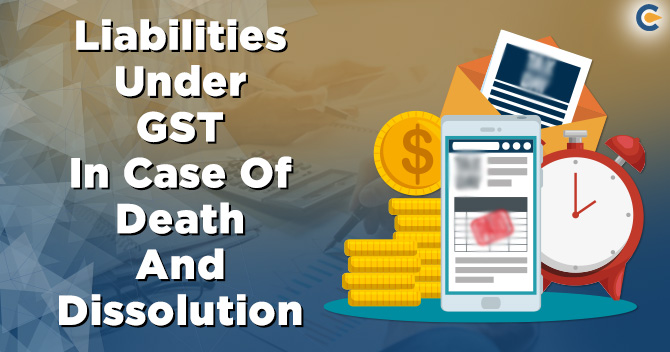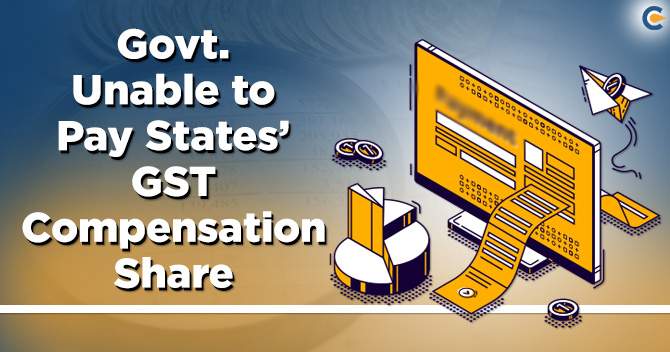In this situation, if the legal heir or legal representative or successor of a deceased person does not intend to continue a business, even then, he has some liabilities under GST law, which he has to fulfill or complied under Goods and services tax.
Liabilities under GST in case of death
In case the taxable person is liable to pay the unpaid tax, interest or penalty dies, then following provisions are to be followed to understand when to pay GST and by whom:
- If a business is continued – If a business is carried on after the death of the person, by his legal heir or the legal representative or any other person, then a legal heir or the legal representative will be held liable for the unpaid dues
- If a business is discontinued – If a business carried on by a person is discontinued, whether before or after the death, his legal heir or legal representative must be liable to pay the unpaid amount. However, payment will be made out of the estate of a deceased, only to the extent to which an estate can meet the unpaid tax, interest, or the penalty. At any point in time, a legal heir or legal representative will not be personally liable and needs to be aware of when to pay GST, i.e., pending due
The liability in case of the death will hold if the unpaid tax, interest, or penalty was determined before the death of a taxable person but is unpaid or undetermined after death.
Read our article:Step by step guide on how to check GST Registration Status
Liabilities under GST in case of partition of HUF/AOP
In case a taxable person is liable to pay the unpaid tax, interest or penalty is part of the Hindu Undivided Family (HUF) or Association of Persons (AOP). The property of a HUF or AOP is partitioned amongst the various members or groups of members. Each member or group of members must be jointly and severally liable to pay any unpaid tax, interest, or a penalty, up to the time of a partition, they must be well informed about when to pay GST. The liability in case of the partition of HUF and AOP holds if the unpaid tax, interest, or penalty was determined before a partition but is unpaid or undetermined after partition.
Liability in case of Company Liquidation
If any company is winding up due to its own motion or under the court or tribunal’s order, then the liquidator of the company is obligated to convey the Commissioner within 30 days about his appointment. The Commissioner shall within 3 months of the time period inform back to the liquidator of the amount of tax, penalty or interest the company has to pay.
In case it is a private company and has not paid its dues, then the liability of the directors of the company will be that they shall be jointly and severally liable for all the dues and only those directors who were present in the office throughout the period when the tax was due shall be held liable. The burden of proof is on such director, if he proves that non payment was not because of his negligence then he shall not be held liable.
Liabilities under GST in case of dissolution of a firm
In case the taxable person is liable to pay unpaid tax, interest or penalty is a partnership firm, and the firm is dissolved. Every person who was a partner must be jointly and severally liable to pay the unpaid tax, interest, or penalty due to the firm’s time of dissolution. Such a person needs to understand the liability provisions to determine when to pay GST. The liability in case of dissolution of the firm will hold if the unpaid tax, interest, or penalty was determined before the dissolution but is unpaid or undetermined after dissolution.
Liabilities under GST in case of termination of guardianship or trust
In case the taxable person who is liable to pay unpaid tax, interest or penalty is either the guardian of a ward on whose behalf the business is carried out by him, or, is the trustee who carries on the business under a trust for a beneficiary, and the guardianship or trust is terminated. The ward or a beneficiary must be liable to pay the unpaid tax, interest, or the penalty due from a taxable person, up to the time of termination, after which the due date, i.e., when to pay the GST, be determined. The liability in the termination of guardianship or trust holds if the unpaid tax, interest, or penalty was determined before the termination but is unpaid or undetermined after termination.
Liabilities under GST in case of discontinuance of business by firm, HUF or AOP
In case the taxable person who is liable to pay unpaid tax, interest, or penalty is either a firm or the HUF or an AOP, has decided to discontinue the business for some reason. The following provisions require to be followed to estimate the liability and understand when to pay the GST:
- Tax, interest, or penalty payable by the firm, HUF or AOP, up to date of discontinuance, can be determined as if no discontinuance had taken place.
- At the time of the discontinuance, every person was a partner of a firm, or HUF or AOP must be jointly and severally liable for the payment of an unpaid tax, interest, and the penalty as if he were himself a taxable person.
The liability in the discontinuance of business will hold if the unpaid tax, interest, or penalty was determined or imposed before or after discontinuance.
Liabilities under GST in case of reconstitution of firm or AOP
In some instances, there are changes made to a firm’s constitution or an association of persons (AOP) known as reconstitution. In such cases, all the partners of a firm or members of the association, who were there at the time of the reconstitution must be jointly and severally liable to pay any unpaid tax, interest, and penalty, as it exists either before or after reconstitution. The liability in case of reconstitution of the firm or AOP will hold under all circumstances. It will need to be understood by all stakeholders who need to become then aware of when to pay GST.
Conclusion
- Section 29(1) says that the proper officer can either on his own motion or the application filed by a registered person or by his legal heirs, in case of death of such person, can cancel the registration as per the law specified under the CGST Act, 2017.
- Section 85(1) of the CGST Act states that, Where the taxable person, liable to pay tax under the Act, transfers his business in whole or in part, by sale, lease, gift, leave and license, hire or in another manner whatsoever, the taxable person and a person to whom the business is so transferred must jointly and severally, be liable wholly to the extent of such transfer, to pay a liabilities under GST tax, interest or any penalty due from the taxable person.
- Section 93(1)(a) of the CGST Act, 2017 states that if the business carried on by a person is continued after his death by his legal representative or any other person, the legal representative or another person, must be liable to pay tax, interest or penalty due from such person under this Act.
Read our article:How to apply for GST registration certificate online?











